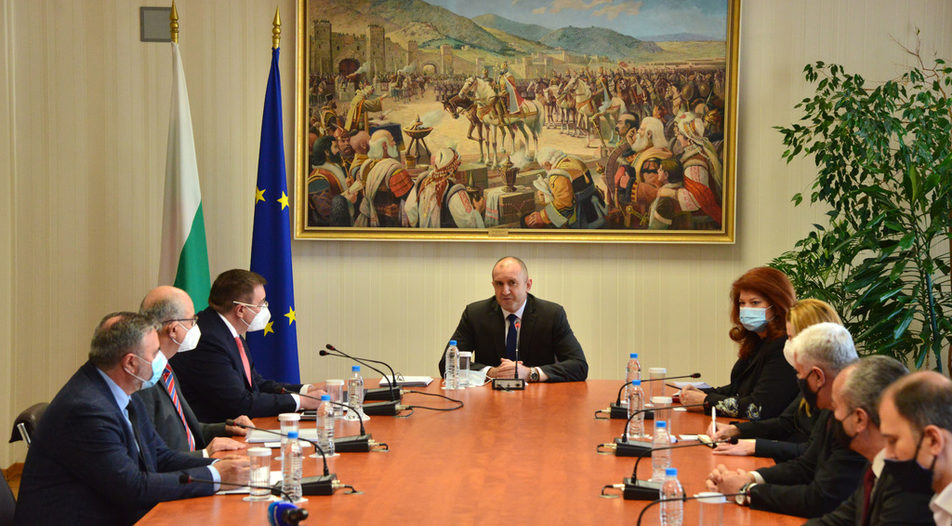On Thursday, 14 January, after two weeks of consultations, white smoke billowed from the balcony of Dondukov 1, the seat of the Bulgarian Presidency. After consultations with the electoral and health authorities, (most of) the parliamentary parties and some of the most vocal out-of-parliament opposition forces, the head of state Rumen Radev announced the date of the next general elections - 4 April, the first Sunday of the month.
"Last year's events clearly showed that Bulgarians want rapid change to restore the country's democratic path, a cause I have always backed," Mr Radev said while announcing the date.
He might be overly optimistic, if recent polling is to be trusted - in fact, the ruling GERB party, seemingly in free-fall since last summer, has stabilized its support. Rifts within the opposition parties have stalled their momentum since the summer protests.
And this doesn't even take into account that the vote will take place amid uncertainty and with Covid still raging.
Vote in a pandemic
As usual, President Radev did not spare his criticism of the current government, warning all institutions responsible for organizing the election to prepare adequately. "None of the responsible institutions initiated adequate legal or organizational measures to prepare for them [elections]," he added, saying that he is giving the extra week between 28 March and 4 April for the legislature to prepare effectively for the extraordinary circumstances surrounding the vote.It is clear that voting will have to go ahead during an ongoing pandemic. Although the number of infections is currently falling in Bulgaria, it is quite possible that the country will need yet another round of "stay at home" after the current lockdown ends at the beginning of February. The new strain of the virus, currently rampaging through the UK, could well be loose on the continent by the spring. With increased hospital admissions, the government might have no alternative but to enter another lockdown.
In this rather daunting situation, voter turnout is uncertain. Unlike the US, Bulgaria has zero options for voting from a distance. It is either in person, or not at all. This puts a huge question mark over any pre-election polls and party strategies.
This is confirmed by an Alpha Research poll from last week which sees a 10% decrease of the number of respondents who said they will certainly vote compared to September 2020 (55% versus 50%).
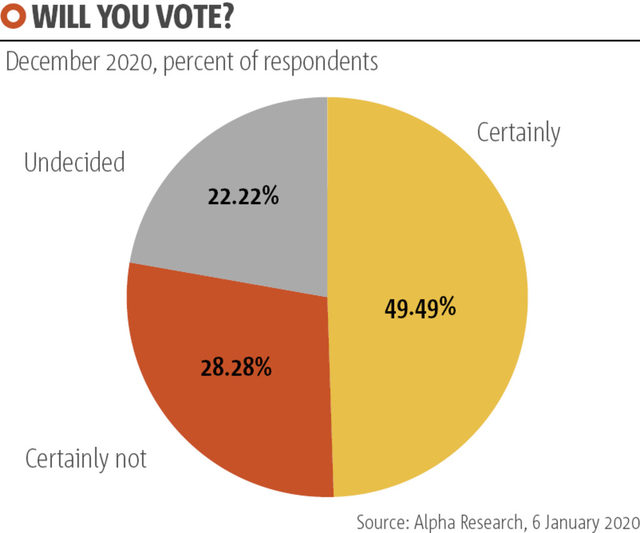
Potential electoral frauds aside, the most serious obstacle to the smooth execution of the election process is a shortage of volunteers to man the voting stations, including the estimated 1813 mobile commissions and polling stations required to cover all the quarantined people across the country.
Because Sofia pre-ordered predominantly vaccines from AstraZeneca, which are still pending EU regulatory approval, mass vaccination would likely start too late to include all potential voters. Additionally, due to mass opposition to vaccination, it is even less likely that parties would push for mandatory vaccinations for their members.
The President made several demands from the legislature. He asked Parliament to change the electoral code to allow people under quarantine at the time of the election to cast their ballot, allow postal voting for Bulgarians voting from abroad, install video surveillance in polling stations and live broadcasting of the counting of the vote.
All of these proposals followed consultations with opposition leaders, many of whom share doubts that a GERB administration could ensure a fair electoral process. Most of those demands were rejected.
Last minute electoral code changes?
In a normal electoral year, opening up the never-ending list of proposals to mend the Bulgarian electoral code is the go-to move of all previous governments. The powers of the day never shied away from changing rules in order to boost their gains.
Not this year.
GERB spokespeople immediately responded to the President's announcement by accepting the date of the vote but not endorsing changes to the electoral code. In recent days, various politicians from the ruling party have publically attacked postal voting and attempted last minute changes to the electoral code. "[We from GERB] think that all types of somewhat exotic ideas for changing the electoral code before the elections are unacceptable," said the head of the parliamentary group of the ruling party Daniela Dertikova while meeting President Radev in January. "The alternative forms of voting proposed cannot be organized in such a short time, while ensuring the secrecy of the vote," vice Prime Minister Tomislav Donchev added.
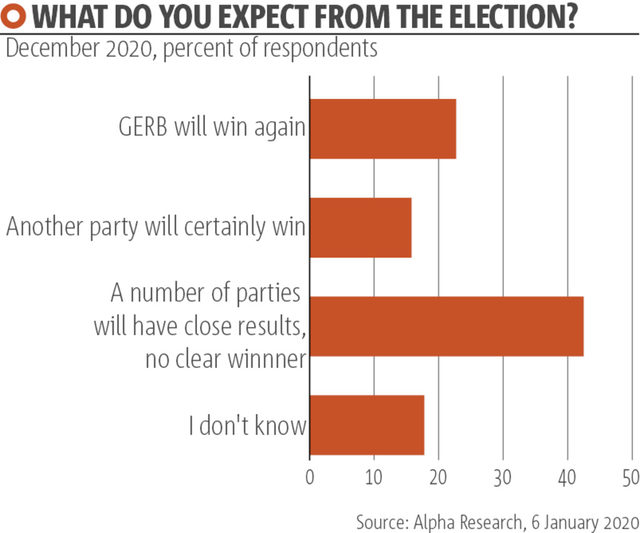
These statements are ironic for several reasons. First, they come from the representatives of the party that has ruled for the better part of the last decade and who have had plenty of time to implement these and other sought after changes to election rules. In fact, the referendum in 2015 saw 71 percent of 2,5 million voters support electronic voting. It was the idea of ex-President and GERB nominee Rosen Plevneliev. Secondly, if Mr Donchev really wanted to see e-voting through, he could have done something to this end before 2019, until when he held the e-governance portfolio.
Last, but not least, GERB has a long and well recorded history of changing the rules just months before elections, causing mayhem and confusion. The most recent example of this was the notorious April-May 2016 change to the electoral code that would forever be remembered with MPs voting to make voting compulsory, only to re-vote on their own decision the next day so that they practically revoked it.
It still stands as an obligation - unenforceable with any means, as a tribute to parliamentary madness.
Borissov's head start
Meanwhile, Prime Minister Boyko Borissov is a step ahead of everyone else, campaigning from his favorite Toyota jeep. After the wave of discontent he has completely insulated himself and spends his time live streaming from different construction sites around the country. The protests of the summer of 2020 and the dreadful Covid-19 death rates from November seem to have passed him by. Instead he seems to exist in a parallel universe as he drives across the country, hugging supporters for selfies. He has also ceased engaging with journalists.
This seems to be a strategy that at least allows for control. Most observers expect a lower turnout due to the pandemic, allowing the bigger parties to mobilize their core supporters.
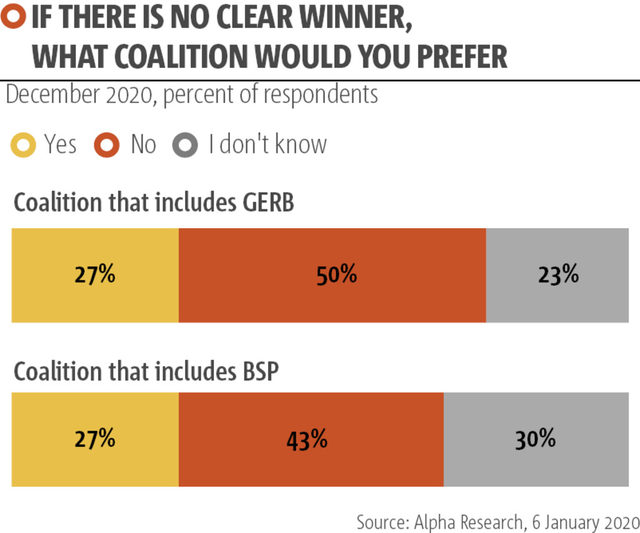
It means that Mr Borissov's game of only appealing to his base electorate, projecting his favorite image of "builder" and "giver" of funds, would likely minimize the fallout from the scandal-marred 2020.
Opposition divided
The same poll by Alpha Research confirms this hypothesis. After losing popularity in September 2020, GERB caught up in January and now stands at 24,3 percent of the vote (compared to 20,5 percent in September 2020), with its main opposition BSP lagging behind at 21,9 percent (compared to 19,6 percent).
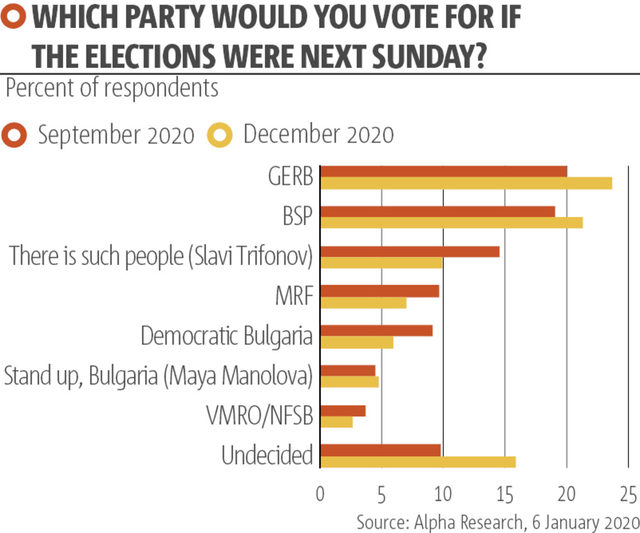
The socialist party is unlikely to catch up. Besides a traditional lack of fresh messages to woo the general electorate, the main opposition has been engulfed in a series of internal ruptures. First, six MPs split from the party after the re-election of Kornelia Ninova as its chairman in September last year and then, in January 2021,two key party figures were eliminated for their "closeness" to GERB. While these moves may somewhat consolidate the thinning socialist core (the party is mostly supported by elderly voters), they would not attract new voters.
From the non-parliamentary fractions that have chance to enter parliament, at least two populist parties would likely make it to the next National Assembly. These are ex-ombudsman, ex-BSP Maya Manolova's Izpravi se.bg (Stand up, Bulgaria) movement and showman Slavi Trifonov's "There is such people" with 4,9% and 10,2% anticipated share of the vote respectively. The two parties have no clear program besides being anti-GERB and their only messages seem to be against the status quo as a whole. Yet, it is not unlikely that they might form an anti-GERB coalition - if they get enough seats for that. But a Hungarian-style scenario whereby all opposition forces join hands before the elections seems impossible in Bulgaria currently.
The other two parties that would most likely enter parliament are the Turkish MRF with a stable vote (depending on travel restrictions and activity in Roma sections their vote will likely fluctuate) and the Democratic Bulgaria coalition. The latter, which includes Hristo Ivanov's Yes, Bulgaria! Party, is projected to win 6,1% of the vote.* It has rather lost momentum after reaching close to 10 percent of the projected vote amidst the summer protests which, most famously, were preceded by Ivanov's conspicuous attempts to expose corruption. But it is trying to get back on the big stage through boosting civic initiatives. The most prominent one is the "Ti Broish" ("You Count") platform that is recruiting 12,000 election observers to double check the official count of the vote by the Central Electoral Commission.
Another poll published on 21 January by the Gallup International - Balkan agency see a relatively similar balance of forces among the first five parties (GERB currently gets 22,9 percent of the vote of respondents, BSP -19,2 percent, Slavi Trifonov's party - 12,4 percent, MRF - 10,9 percent and Democratic Bulgaria - 6,2 percent). At the same time, the agency sees the potential support that the nationalist coalition of VMRO and NFSB, currently part of government, as well as Izpravi se.bg, stand around the 4,5 percent threshold, which makes their potential entry into the National assembly dependent on their campaign efforts. Notably, the agency underlines that it is hard to predict the potential weigh of the vote due to uncertainty about the electoral turnout rates due to the pandemic.
So what then?
At this point it seems Bulgaria is heading for a fractured parliament with fluctuating possible coalitions. This is not the worst possible outcome. The current parliament had weak public support and a stable coalition but ended in disgrace and chaos.
But the fluctuations will not end in April. After the parliamentary elections, there will be a Presidential vote, most likely in October-November.
All the power in the country will be up for grabs this year. Unlike in the last several elections, it is far from clear GERB will manage to succeed.
*In addition to Ivanov's Yes, Bulgaria! Democratic Bulgaria is made up of Democrats for a Strong Bulgaria (DSB), led by Atanas Atanasov, and the Greens.
On Thursday, 14 January, after two weeks of consultations, white smoke billowed from the balcony of Dondukov 1, the seat of the Bulgarian Presidency. After consultations with the electoral and health authorities, (most of) the parliamentary parties and some of the most vocal out-of-parliament opposition forces, the head of state Rumen Radev announced the date of the next general elections - 4 April, the first Sunday of the month.
"Last year's events clearly showed that Bulgarians want rapid change to restore the country's democratic path, a cause I have always backed," Mr Radev said while announcing the date.








